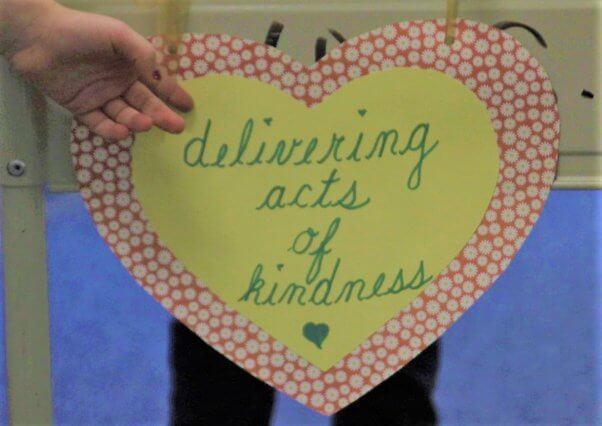Teacher Spotlight: Meet Our Montessori Friends Martha Readyoff and Nora Hulton
The Teacher Spotlight highlights the work of various humane educators, giving them a chance to share their stories and tips and inspire other compassionate teachers like you to take action for animals through education.
Martha Readyoff and Nora Hulton have been teaching compassion for animals within a Montessori program for a combined total of 27 years. Martha was a lower elementary educator before becoming the director of learning support services at her school, while Nora is a middle school ecosystem studies educator.
They went vegan after various events in their lives—such as when Martha saw the film Forks Over Knives. They both understand how easy it is nowadays to adopt a compassionate lifestyle and are eager to cultivate discussions about vegan living and its relationship to Montessori ideals.
How does compassion for animals fit into a Montessori elementary curriculum?
Martha: There are many ways in which respect for the Earth and all its inhabitants is present throughout the curriculum. We talk a lot about empathy, how someone else might be feeling; this is easily extended to animals. I think it is with animals that children often first experience real empathy, because the animals they know are the only beings in their lives with less power than they have. Children care about animals because they can relate to them.
Nora: During nature studies, we talk about how every living thing has an important purpose. Humans also need to see their purpose as part of the natural world, not as separate from it.
Stewardship of the environment is a core Montessori principle.
How has studying animal issues benefited your students?
Martha: I think allowing space for and nurturing a love for animals is beneficial for children because it allows them to become more fully compassionate and empathetic human beings. This translates into every other area of their lives and the lives of people they touch: their relationships with friends and family, their sense of purpose in the world as agents of positive change, their patience with themselves as they learn, make mistakes, and grow. Maria Montessori wrote, “When children come into contact with nature, they reveal their strength.” Nature includes animals large and small, and the strength revealed is, I believe, children’s capacity for wonder and love.

What has been the response of your Montessori school community (administrators, other teachers, parents, etc.) to your humane education work?
Martha: We have such an open and warm school community that it has been accepting. Because we don’t teach humane education as a discrete unit but rather let it emerge from places in the existing curriculum, it is in many ways a natural fit. We were able to hold a “vegan challenge” a couple of years ago, in which any staff member could design their own challenge—from eating vegan for a week to reading one article each day about factory farming to just hugging a vegan. At teacher appreciation lunches and staff parties, there are always vegan options. Several teachers have made great progress in moving closer to a plant-based diet!
Nora: Recently we’ve been able to partner with a local farmed-animal sanctuary. One group of middle school students worked at the sanctuary for a service day on Martin Luther King Jr. Day. The sanctuary folks have also talked with our middle school Green Team, as the students shared their ideas for living more sustainably.
What challenges, if any, do you face as a humane educator in a Montessori environment, and how do you overcome them?
Martha: It takes a great deal of diplomacy to talk about and ask people to think about animal rights in any community. A few years ago, I had articles rejected from national and international Montessori periodicals because the editors felt that my perspective—exploring the values shared by vegan living and Montessori—was not inclusive enough (meaning, I suppose, not inclusive of cultural and traditional practices that involve animals). Really, though, I think it is just too uncomfortable a subject (the ways we mistreat animals, how we use them for food, science, and entertainment) for most people to take on.
I used to shy away from these conversations for many reasons—fear of offending someone, feeling as though I didn’t know enough, not wanting to be that vegan, and feeling like I had to say the exact right thing in the exact right way. But now I feel an urgency that eclipses my own discomfort, an urgency on behalf of the animals, the environment, life, and diversity. I want to demonstrate all the ideals I espouse as a Montessori teacher. Good conversation is one of the greatest tools we have for advancing change in the world.
Note from TeachKind: Check out our feature on dealing with opposition to humane education in your school.
So I will keep having conversations in the most Montessori way possible: with deep respect and compassion for my partners in conversation, with a spirit of honest inquiry, with a willingness to learn and widen my own perspective, and with a seeking of common ground.
How do you educate students about animal issues without “preaching”?
Martha and Nora: There is so much that is inherent in the curriculum about compassion and human humility that there is never a need to “preach.” It just needs to be teased out and allowed to grow. Many Montessori lessons have more of a Socratic structure to them, even in the youngest levels. There is much more back and forth of open discussion and inquiry between teacher and students as well as among the students themselves. Children are naturally empathetic toward animals; they have to be taught to lose that empathy. So allowing them the space to express their empathy and love for animals, nurturing that instinctive love, is all we need to do as teachers. Montessori lessons and classroom environments provide that space.

What advice would you give someone who wants to start teaching humane education within a Montessori program but isn’t sure where to begin?
Martha and Nora: Definitely start from the curriculum. There are so many points of entry there for opening up discussion about compassion for animals.
Sometimes it’s just about slightly reframing the questions. There are early elementary lessons about living beings and nonliving things. These are open-ended presentations and discussions that help children think critically about what “alive” means. A wonderful follow-up for older children might be a discussion of sentience: What does it mean to be sentient? Who is sentient?
Another entry point for humane education is through sustainability initiatives in schools. Animal agriculture and its devastating effects on the environment are becoming more widely understood and recognized. “Green” or sustainability committees are good places to begin to talk with other teachers and perhaps open-minded parents about the benefits of plant-based living. We also started a book group for people in and outside the school community to read about climate change and the effects of animal agriculture.
Montessori teachers are experts at finding and using teachable moments. Just keep looking for those moments to shine a light on humane education and kindness to animals. Also, of course, check out TeachKind!
*****
If you’re a Montessori teacher who would like to chat with Martha and Nora, please e-mail us at [email protected]!
Inspired to start teaching compassion for animals in your classroom? TeachKind will walk you through every step of the process and provide free resources along the way.
Fill out the form below to sign up for TeachKind News.
By submitting this form, you’re acknowledging that you have read and agree to our privacy policy and agree to receive e-mails from us.





